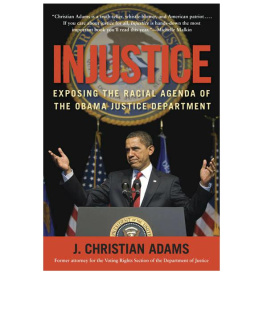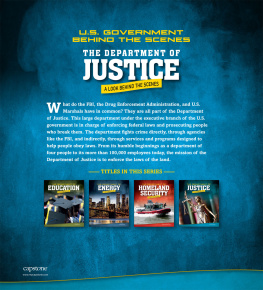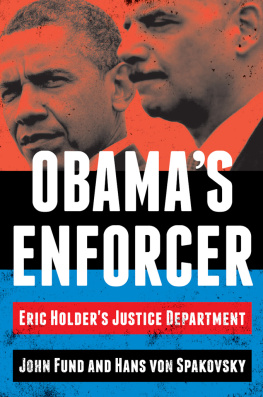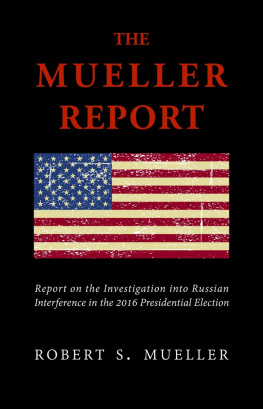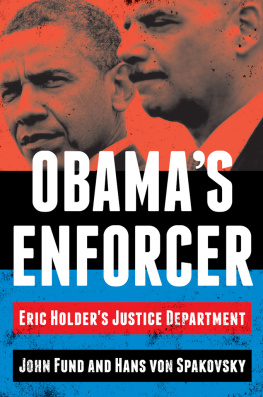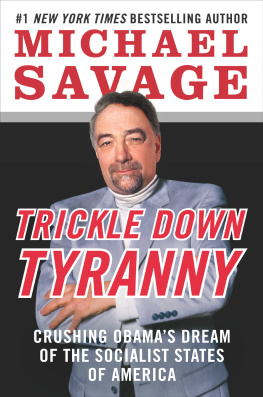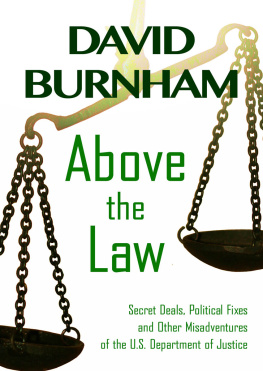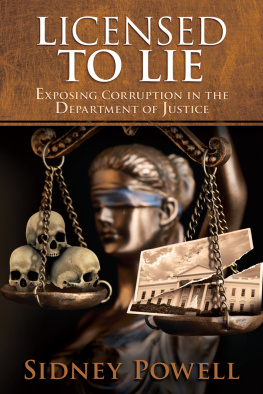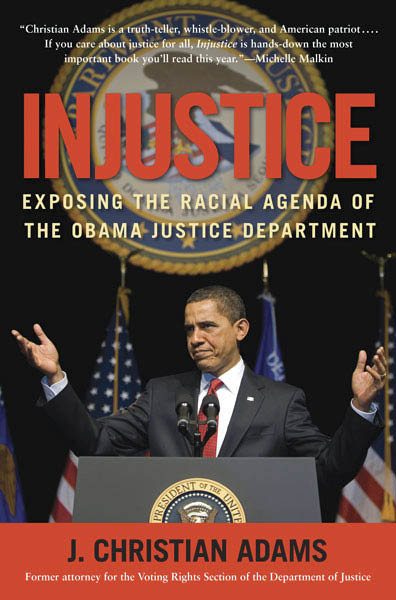
Copyright 2011 by J. Christian Adams
All rights reserved. No part of this publication may be reproduced or transmitted in any form or by any means electronic or mechanical, including photocopy, recording, or any information storage and retrieval system now known or to be invented, without permission in writing from the publisher, except by a reviewer who wishes to quote brief passages in connection with a review written for inclusion in a magazine, newspaper, or broadcast.
First ebook edition published 2011
eISBN: 978-1-59698-284-0
The Library of Congress has cataloged the hardcover edition as follows:
Adams, J. Christian.
Injustice / by J. Christian Adams.
p. cm.
ISBN 978-1-59698-277-2
1. United States. Dept. of JusticeCorrupt practices. 2. Political corruptionUnited States. 3. United StatesPolitics and government2009- 4. PresidentsUnited StatesElection2008. I. Title.
KF5107.A712 2011
364.1324dc23
2011034065
Published in the United States by
Regnery Publishing, Inc.
One Massachusetts Avenue, NW
Washington, DC 20001
www.regnery.com
Manufactured in the United States of America
10 9 8 7 6 5 4 3 2 1
Books are available in quantity for promotional or premium use. Write to Director of Special Sales, Regnery Publishing, Inc., One Massachusetts Avenue NW, Washington, DC 20001, for information on discounts and terms or call (202) 216-0600.
Distributed to the trade by:
Perseus Distribution
387 Park Avenue South
New York, NY 10016
To Jana,
who made this possible
For Abigail and Amelia,
who made it necessary
Contents
Payback Time in Mississippi
One Small Step for Justice
Personnel Is Policy
See No Evil
Anatomy of a Scandal
Payback Time Nationwide
Through the Looking Glass
Ending Injustice
Introduction
F or much of his life, Attorney General Eric H. Holder Jr. carried around something peculiar. While most people keep cash, family photos, and credit cards in their wallets, Holder revealed to a reporter in 1996 that he keeps with him an old clipping of a quote from Harlem preacher Reverend Samuel D. Proctor. Holder put the clipping in his wallet in 1971, when he was studying history at Columbia University, and kept it in wallet after wallet over the ensuing decades.
What were Proctors words that Holder found so compelling?
Blackness is another issue entirely apart from class in America. No matter how affluent, educated and mobile [a black person] becomes, his race defines him more particularly than anything else. Black people have a common cause that requires attending to, and this cause does not allow for the rigid class separation that is the luxury of American whites. There is a sense in which every black man is as far from liberation as the weakest one if his weakness is attributable to racial injustice.
When asked to explain the passage, Holder replied, It really says that... I am not the tall U.S. attorney, I am not the thin United States Attorney. I am the black United States attorney. And he was saying that no matter how successful you are, theres a common cause that bonds the black United States attorney with the black criminal or the black doctor with the black homeless person.
Has anyone ever asked Holder what exactly is the common cause that binds the black attorney general and the black criminal? More important, what should the black attorney general do about this common cause? Should the black criminal feel empathy for the black attorney general, or more likely, do the favors only flow in one direction?
Holders explanation of Proctors quote offers some key insights into our attorney generals worldview. First, being more particular than anything else, skin color limits and defines Americansin other words, race comes first for Holder. Second, despite Americans widespread belief in trans-racial principles such as individual liberty and equal protection, blacks are expected to show solidarity with other blacks. And third, black law enforcement officers are expected to show this solidarity toward their racial compatriots, including black criminals.
It may seem shocking to hear these racialist views ascribed to Americas top law enforcement officer. But to people who have worked inside the Civil Rights Division at the Department of Justice, these attitudes are perfectly familiar. In fact, Holders revelation is small stuff compared to the racial bias and leftwing extremism that pervade that institution.
The Civil Rights Division was set up in 1957 by the Eisenhower administration. Since then, as the DOJ website proudly proclaims, The Division has grown dramatically in both size and scope, now employing almost four hundred lawyers and, with support staff, over eight hundred employees. It is responsible for enforcing a wide swath of laws, especially civil rights laws and voting laws.
The division provides a welcoming home for purveyors of fringe beliefs that are alien and repugnant to mainstream Americanamely, that civil rights laws do not protect everyone equally, but only certain oppressed minorities. Not everyone who works there subscribes to these views, but nearly everyone who manages the place now does. As a result, the Civil Rights Division has squandered its moral authority. Having initially been infused with the spirit of the original civil rights movement and its emphasis on racial equality and color-blindness, the division is now home to the rotted industry of racial grievance.
Eric Holder clearly had big plans for the Civil Rights Division from the beginning of his tenure. At his confirmation hearings in January 2009, he called the division the crown jewel of the Justice Department, adding that he wanted to become attorney general in part to restore the divisions great traditions that had supposedly eroded during the Bush administration. Yet Holders term has been marked by racially discriminatory law enforcement, politicized and ideological hiring, court-imposed sanctions on DOJ lawyers, and corrupt decisions to allow American voter rolls to overflow with deceased citizens and ineligible felons.
As shown by the still-murky details of Operation Fast and Furiousa secret operation run by the DOJs Bureau of Alcohol, Tobacco, and Firearms that deliberately allowed guns to flow to Mexican drug cartelsthe DOJ is experiencing serious problems under Holders leadership. Nevertheless, other DOJ divisions by and large dont suffer from the same toxic mix of employee malfeasance and racial bias that infects the Civil Rights Division. When I worked there, attorneys from other divisions would describe their competent, professionally run agencies and then ask me if my division was really as bad as its reputation. The answer was yesand then some. As this book will show, the Civil Rights Division can best be described as a soap opera, within a cabal, surrounded by a racialist culture of dysfunction.
The DOJs dismissal of the New Black Panther voter intimidation casea case I brought and ultimately resigned overgave the public a glimpse of the racially discriminatory worldview that characterizes this influential government agency. But the publicity surrounding that case was unusual. Until now, no one has fully conveyed to the American public exactly how deep the rot goes in the Civil Rights Division, and the many disgraceful scandals that have unfolded behind its closed doors.
People from outside the DOJ typically react in stunned disbelief when I explain the sheer unprofessionalism I saw there. The Obama administration promotes government lawyers who were subject to hundreds of thousands of dollars in court sanctions? You must be kidding, they tell me. Nearly a thousand employees from the nations premier federal law enforcement agency get the day off for a retreat where employees perform juvenile skits? Impossible, they figure. A workplace where people openly protest arriving to work on time? Inconceivable. A government agency opposed to Christmas? No way.

